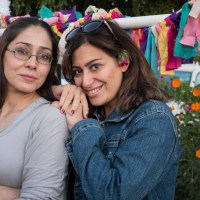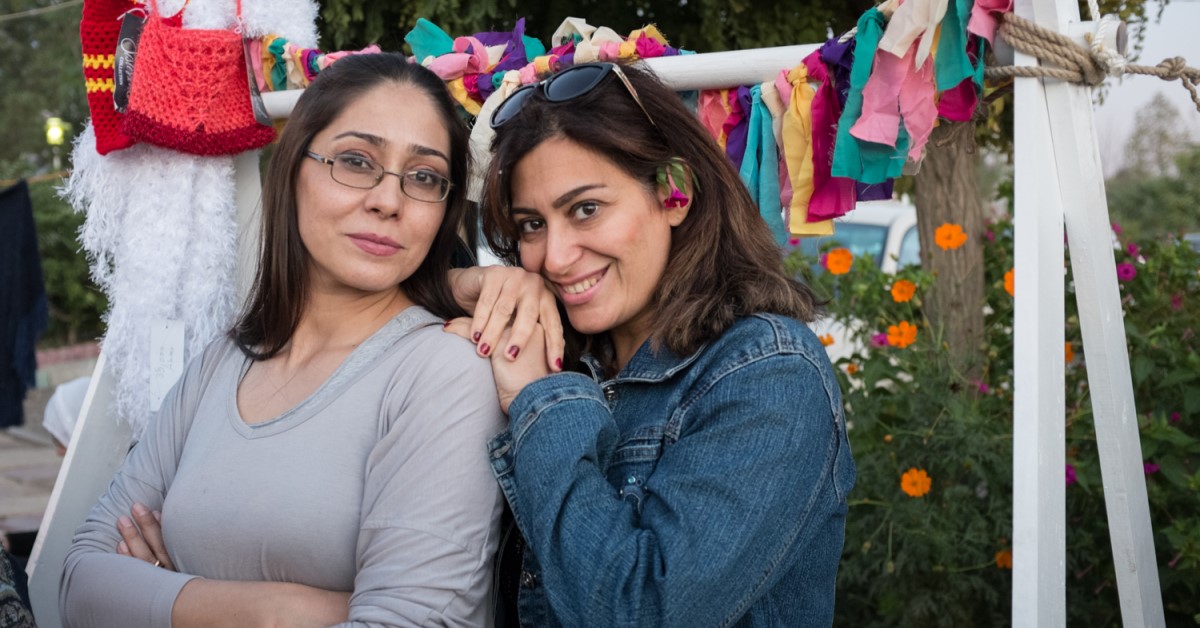Syria. Libya. Syria again. Then Iraq.
Circumstances have dropped Khadija and her family into three separate war zones.
A Syrian refugee, Khadija has a certain kind of boundless, creative energy. She is never still—even when visiting friends or enjoying lingering conversation over tea. There is always something in her hands, in the process of becoming.
I ask if she considers herself business-minded, and she answers with a sweet smile and a nod.
“Of course—because I like what I’m doing!”
From her earliest working days, Khadija found herself working with her hands, teaching, and creating entrepreneurial opportunities. This is the pattern of her life.
Back in Syria, she worked from home, hand-embroidering garments for a local factory. There was more work than she could handle alone and not enough workers as skilled as she was at needlework. So she reached out to other women, taught them to embroider, and hired them to work for her.
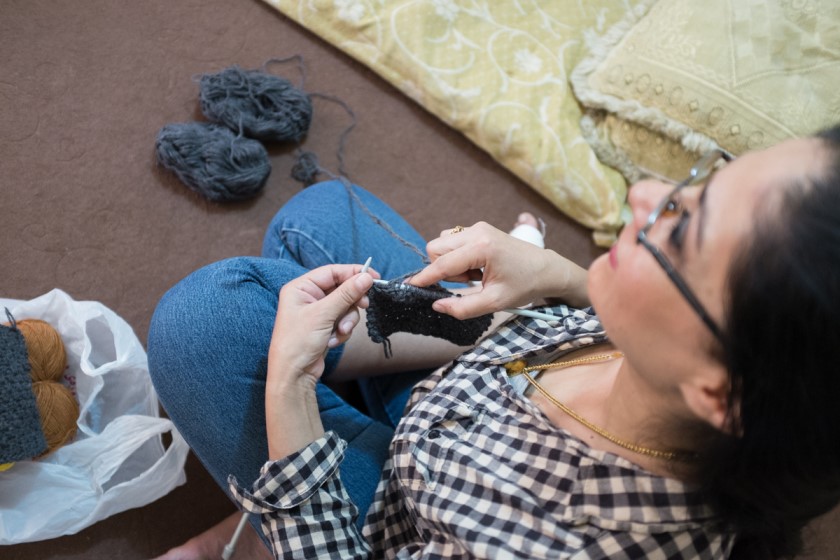
It was good work. It was creative, and it paid well. But Khadija and her husband heard from a cousin that Libya was a great place to start a business, if you were willing to work hard.
This was back before war tore both countries apart at the seams.
Khadija and her husband decided to take a chance: they would live and work in Libya for two years with their baby daughter, save as much money as possible—then return to Syria, buy a house, and begin life with a stable base.
It seemed like the perfect plan… at the time.
Things in Libya looked good at first. Khadija, skilled in hair dying and threading, opened her own hair salon. Local women, eager to learn the craft, paid Khadija to teach them. She then chose the best to work in her salon. Despite start-up expenses, Khadija quickly began to earn a good living from her business. But less than six months into their adventure, the bottom fell out. War broke out among the Libyan tribes.
“So many things have happened in my life,” she tells me between sips of tea, a crochet hook in her hand and brown yarn threaded through her fingers. “My life should be made into a movie!”
Khadija, her husband, and their daughter were trapped in a three-week siege of their community. When they were finally able to flee, squeezed into a neighbor’s car, they drove under bombs as they went.
The first home that they thought would offer shelter was bombed moments before they walked through the front door. At the second home where they stopped, every room was filled with fleeing families—sitting together, listening to the bombs and bullets outside.
Their trip back to Syria included getting lost in the Libyan desert, flights to Egypt and Lebanon and nights sleeping on the floors of airports with a crying baby. When they finally reached Syria, they were stopped on the road countless times by ISIS, the government army, and resistance militias.
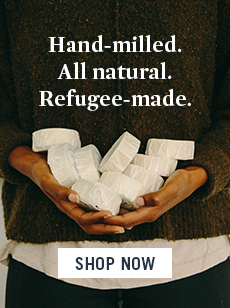
They arrived home emotionally and physically exhausted, financially broke—and in a country embroiled in a brutal civil war of its own.
They stayed in Syria long enough to give birth to their second daughter, but they couldn’t make a home there. It wasn’t safe for them. Eventually Khadija and her family made their way to Iraq. They found a little place to live, and tried for a fourth time to build a life for themselves.
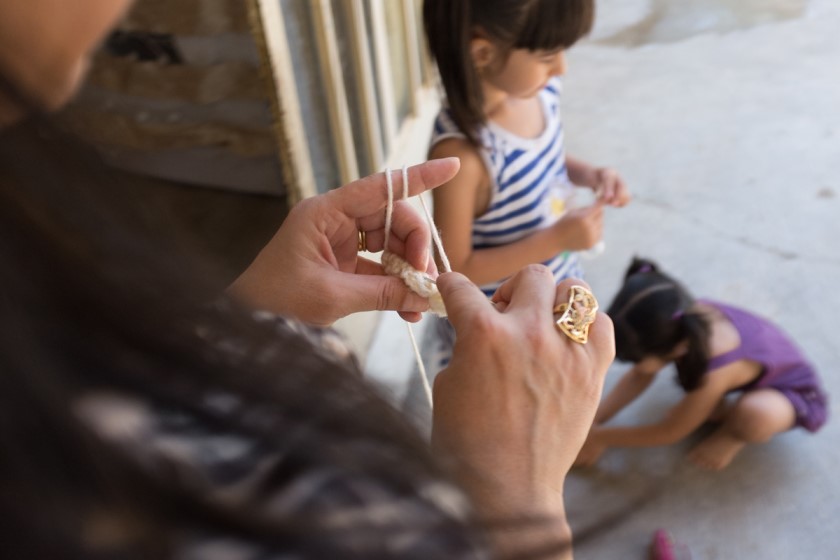
“I love to cook.”
I asked Khadija what things she most loves to do.
“I do salon work, embroidery, knitting, and I crochet…”
Khadija was sitting on her living room floor, with a large crocheted tablecloth spread over her knees, showing us the complexity of her work. Life in Iraq hasn’t been easy. The culture and styles here are different than the ones back home. Some of her skills aren’t in demand here. But she is tireless in trying new techniques and new styles. She is determined to find a way forward for her family.
“I love to sing…”
Khadija folds and sets aside the tablecloth, picks up her crochet needle, and deftly resumes making little brown knit chickens as she sings:
“I love you, and I love anyone who loves you. And I love the red rose because it has the same color as your cheeks.”
The words of this traditional song fill the room, Khadija’s voice high and clear. Her fingers work quickly with the soft yarn, and soon a flock appears on the floor in front of her.
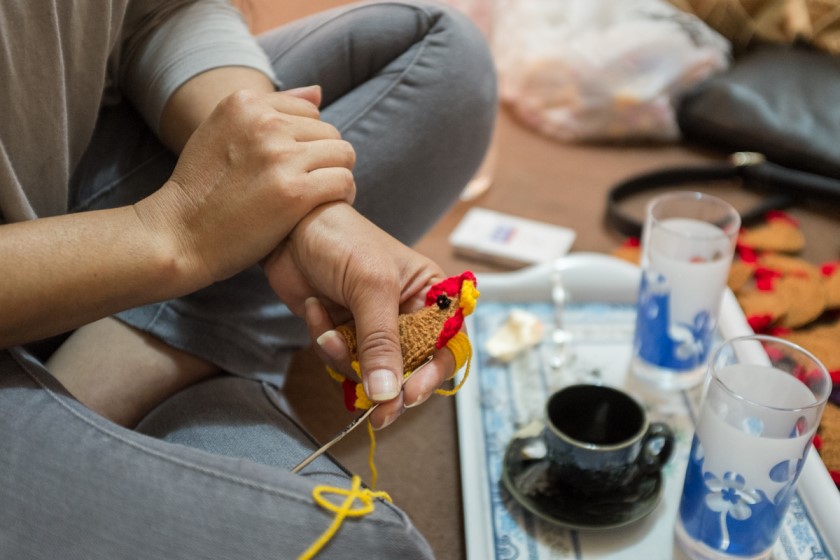
“Creating things gives me energy.” Through the work of her hands, Khadija finds her identity.
“There is a saying: ‘Work is like worship.’ So for me life is about making a useful life, so that God is satisfied with me.”
It would be easy to look at Khadija’s circumstances as a Syrian refugee and think that there isn’t much hope for her. She is far from home, caring for two small children, starting over for the fourth time, living in a different culture, among people who speak a different language.
But her circumstances do not speak to Khadija’s strength. Khadija isn’t afraid to work hard. She isn’t afraid to start from scratch. When Khadija begins a new project, she throws all of herself into the task—even when it’s difficult, she enjoys the challenge.
Khadija sees beyond circumstances. As you look at the refugee crisis playing out in Syria and Iraq, you see more than victims. You see more than tragedy. You see beyond circumstances too.
You see people, full of potential, waiting to be empowered.
Empower Syrian refugees to rebuild their lives.

